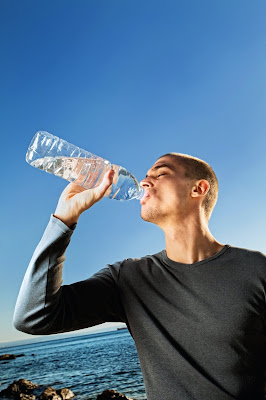Want to keep Healthy by Staying Hydrated? It's Easier Than You Think
Our bodies depend on water to survive. Every cell, tissue, and organ needs water for correct functioning. For example, your body uses water to take care of its temperature, remove waste and lubricate your joints.
Drinking water also prevents infections, improves sleep quality, cognition, and mood, helps in flushing toxins, improves skin complexion, and increases energy levels. Generally, water is needed for you to have good health.
You should drink water daily because water makes up more than half of your body weight. A good rule of thumb is 15 cups each day for men and 11 cups for ladies . Keep in mind that this includes total fluids.
You get 20% to 30% of your water from food. You can get more water from other drinks like juice, tea, and milk. You also get water from fruits and vegetables like watermelons, tomatoes, lettuce, pineapples, grapefruit, cucumber, pear, celery, blueberries.
Signs of dehydration
Dehydration occurs when your body does not have enough water that it requires to carry out its normal functions. You lose water when you are exercising or outside in the heat. You lose water each day when you sweat, breathe, urinate, poop, and spit.You lose water faster when the weather is hot, physically active, or when you have a fever, diarrhea, and vomiting. Dehydration can cause headaches, lethargy, or even constipation.
The following are the signs of dehydration;
- Dark yellow or amber-colored urine or not urinating at all
- Extreme thirst
- Headache
- Sleepiness, fatigue, confusion, or irritability
- Dizziness
- Constipation
- Dry mouth and lips
- Sunken eyes
- Dry skin
- Fainting
- Rapid heartbeat
- Rapid breathing
- Muscle cramps
- Dry mouth and tongue
- No tears when crying
- Sunken eyes and cheeks
- Sleepiness, lack of energy, or irritability
Tips for staying hydrated
- Do not wait till you're thirsty to drink. Keep a bottle of water with you during the day because by the time you are feeling thirsty, you're already slightly dehydrated.
- Whenever you feel hungry, try to drink water. We often confuse thirst with hunger. Hunger won't be satisfied by drinking water. Some research suggests that drinking water, preferably warm water, can help you feel full.
- If you've got trouble remembering to drink water, drink on a schedule. For example, you can drink water when you wake up, at breakfast, lunch, during dinner, and when you go to bed. Or, drink a glass of water at the start of every hour.
- Drink water before, during, and after working out.
- If you cannot drink plain water, flavor it. You can add a slice of lemon, apple, ginger, mint, cloves, or cinnamon.
- Eat rich water fruits and vegetables, for example, watermelons, tomatoes, lettuce, pineapples, peaches, grapefruit, watercress, apples, celery, cucumber, pear, celery, blueberries.
 |
| A collection of hydrating fruits |
- If possible, stay inside when it gets too hot so that the body retains enough water for optimal functioning. If you work out outdoors, take frequent breaks and let the body cool.
- Avoid taking caffeine and alcohol. These can cause dehydration, which stops your body from controlling its temperature properly. And if you cannot hesitate from drinking alcohol, endeavor to drink water after.
- Dress for the weather. Wear light clothing during hot weather so that air circulates and heat escapes.




Wow this is great💗💕
ReplyDeleteAll we need
ReplyDeleteThanx alot Maria for the tips av learnt how to drink more water than I used to in order to have a better health
ReplyDeleteThank u Maria
ReplyDelete